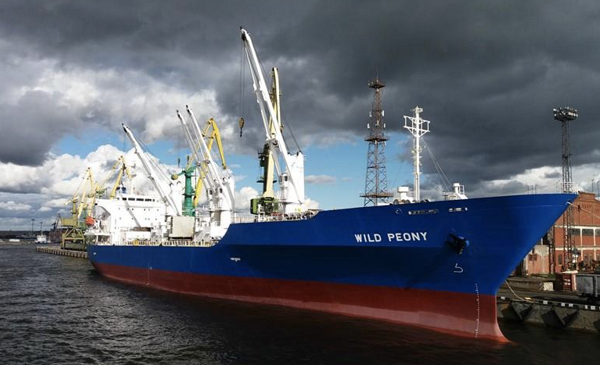Whereas usually Anlin Shipping doesn’t budget for vessels during April, this year three of their vessels have taken already 15,000 pallets over two and a half weeks to Rotterdam and St Petersburg of South African grapefruit, lemons, soft citrus, a bit of navels.
Highly unusual, too, was the freight on the Crown Garnet, loaded mid-April, with just under 2,000 tonnes of apples for the UK carried below-deck.
“It was the first in a bitterly long time that we’d done apples of this volume,” explains Charles Gantz, managing director at Anlin Shipping. “Usually we carry apples and pears in containers on-deck. It just shows you what impact the current disruptions are having that exporters were willing to carry the apples below-deck, and with great success.”
 The Wild Peony departed South Africa last week with a full load of citrus for the EU and Russia
The Wild Peony departed South Africa last week with a full load of citrus for the EU and Russia
There’s definitely a shift underway from containers to conventional shipping, he affirms, as a combination of factors: container availability, the congestion at harbours, the concomitant backlog that has to be worked away. The shift has prompted Mitchell Brooke, logistics manager at the Citrus Growers' Association to remark that the Wild Peony, a Reefer Alliance vessel that departed South Africa last week, was probably the first ship in a long time to leave with a full load of citrus for the EU and Russia.
“There’s a whole lot of on-deck container freight that has come over to conventional, definitely more than if this were a normal season.”
“Our service is based on our “FDD” model, Fast, Direct, Dedicated and 100% dedicated to fruit, therefore direct to the destination. You load directly for Rotterdam or for St Petersburg or, later in the season, for Lisbon. The two things that clients get from us are integrity of the schedule and the service. If we say we’re loading on the first of the month, that’s when we load, and for exporters running supermarket programmes it’s of great value to plan ahead and be certain of arrival dates.”
“Yes, we also have our challenges to maintain schedule integrity and it is not always going as smoothly as planned, but we strive to resolve and manage these challenges to the best of our ability.”
Citrus breakbulk cost lower per carton
The drop in the oil price makes a citrus breakbulk shipment more competitive per carton than container shipping, he adds, despite the fact that breakbulk vessels taken fewer cartons per pallet, because of deck height restrictions. “Even if it weren’t for the coronavirus, the fact that we’re more competitive, especially on our price until the end of July, works in our favour.”
“And then there are the hidden costs of inefficiencies out of your control, like decongestion at the harbour or product clogging up packstores.”
There are apple packstores in the Western Cape with fruit for the Far East and Middle East that aren’t moving, because of container shortages and so forth.
The decision to make the move back from containers to breakbulk has a psychological component, he says, because when a conventional vessel arrives with 4,000 pallets it seems like a huge volume, compared to the scattering of containers that arrive on various vessels, but in reality when pallets are calculated as containers, the volumes are completely in line.
They carry about 4,500 pallets below-deck and 1,500 pallets in containers (which they own) above-deck, around 6,000 pallets per shipment, employing standard height pallets.
As for the actual extent of container shortages, he says reports vary. Some big exporters who usually require around a hundred containers a week have only been able to receive a third of that, while others report no problems getting hold of what they need, but then they might be experiencing problems with other disruptions.
“These are very tough times. Farms have their challenges to keep operations going, exporters are under a lot of pressure to service their markets and keep programmes going. The only thing to do is to forge ahead and for that, the Reefer Alliance (Seatrade and Baltic Shipping) and its specialised reefer model and service is well equipped and positioned, to give the industry the workable alternative shipping platform.”
 For more information:
For more information:
Charles Gantz
Anlin Shipping
Tel: +27 21 914 3979
Email: Charles@anlin.co.za
https://www.anlin.co.za/
